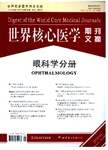饮食中添加抗氧化剂与年龄相关性黄斑变性患病风险的关系
Dietary intake of antioxidants and risk of age-related macular degeneration作者机构:Dr. Netherlands Ophthalmic Research Institute KNAW Meibergdreef 47 1105 BA Amsterdam Netherlands
出 版 物:《世界核心医学期刊文摘(眼科学分册)》 (Digest of the World Core Medical Journals:Ophthalmology)
年 卷 期:2006年第2卷第4期
页 面:2-3页
学科分类:1002[医学-临床医学] 100212[医学-眼科学] 100201[医学-内科学(含:心血管病、血液病、呼吸系病、消化系病、内分泌与代谢病、肾病、风湿病、传染病)] 10[医学]
主 题:年龄相关性黄斑变性 患病风险 抗氧化剂 脉络膜新生血管 饮食 β-胡萝卜素 玻璃膜疣 受试者
摘 要:Context: Age-related macular degeneration (AMD) is the most prevalent cause of irreversible blindness in developed countries. Recently, high-dose supplementation with beta carotene, vitamins C and E, and zinc was shown to slow the progression of AMD. Objective: To investigate whether regular dietary intake of antioxidants is associated with a lower risk of incident AMD. Design: Dietary intake was assessed at baseline in the Rotterdam Study (1990-1993) using a semiquantitative food frequency questionnaire. Incident AMD until final follow-up in 2004 was determined by grading fundus color transparencies in a masked way according to the International Classification and Grading System. Setting: Population-based cohort of all inhabitants aged 55 years or older in a middle-class suburb of Rotterdam, the Netherlands. Participants: Of 5836 persons at risk of AMD at baseline, 4765 had reliable dietary data and 4170 participated in the follow-up. Main Outcome Measure: Incident AMD, defined as soft distinct drusen with pigment alterations, indistinct or reticular drusen, geographic atrophy, or choroidal neovascularization. Results: Incident AMD occurred in 560 participants after a mean follow-up of 8.0 years (range, 0.3-13.9 years). Dietary intake of both vitamin E and zinc was inversely associated with incident AMD. The hazard ratio (HR) per standard deviation increase of intake for vitamin E was 0.92 (95%confidence interval [CI], 0.84-1.00) and for zinc was 0.91 (95%CI, 0.83-0.98). An above-median intake of all 4 nutrients, beta carotene, vitamin C, vitamin E, and zinc, was associated with a 35%reduced risk (HR, 0.65; 95%CI, 0.46-0.92) of AMD. Exclusion of supplement users did not affect the results. Conclusion: In this study, a high dietary intake of beta carotene, vitamins C and E, and zinc was associated with a substantially reduced risk of AMD in elderly persons.



